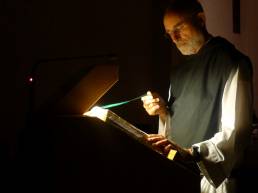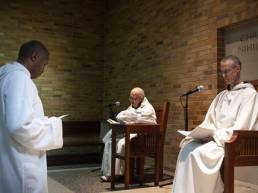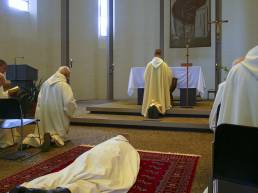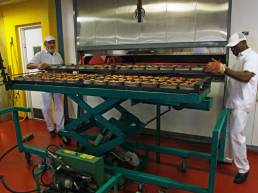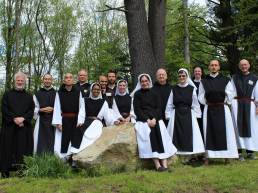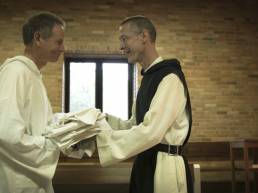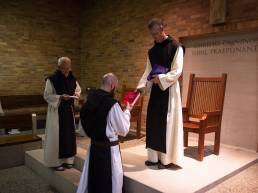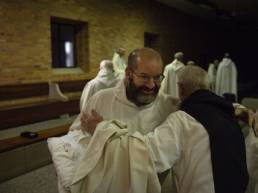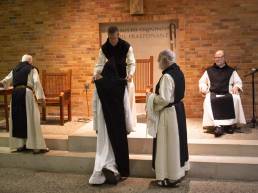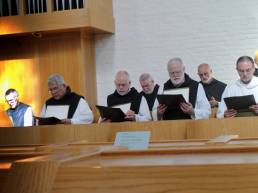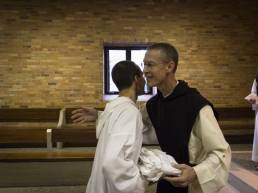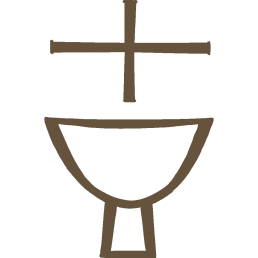
Coming to the Monastery
“What do you seek, brother?” The abbot’s question to the candidate for monastic commitment reaches and probes the depths of the soul. “The mercy of God and of the Order,” the newcomer responds. And so begins the work of a lifetime: searching, learning, discovering the meaning of mercy, which transforms the heart of the monk into the Lord’s own image. Getting started and persevering in the vocation are graces only God can give. The monk recognizes this gift and strives to open to it generously, for he has met Jesus in his life. His mission, his service in the Church and the world is to follow Christ more closely and to find God at the center of life.
Ora et Labora
Gethsemani, as part of the Roman Catholic Cistercian Order of the Strict Observance (OCSO), follows the Rule of St Benedict as interpreted by its own Constitutions and Statutes. It is a monastery under the rule of an abbot. Ora et Labora is stamped on every box of fruitcake that goes out of the monastery. In English, the phrase means “Pray and Work,” two imperatives. These are the two broad categories under which most of our activities fall.
Under prayer we would find the daily Mass, the centerpiece of the day, the recitation of the psalms through our daily offices, lectio divina, or scriptural reading, and private prayer. Our work is manual labor for the most part. We support ourselves by making fruitcake and fudge. In addition, the monks take turns with housekeeping chores. There is some internal work as well, cooking, laundry and so forth. Those in formation will attend regular classes. The OCSO does not engage in traditional parish work.
What is it like to enter the monastery?
In this video, novices Joseph, Lazarus and Abel share their monastic day and their thoughts on monastic life at the Abbey of Gethsemani. All three have since made their simple profession and have moved from the novitiate to the juniorate.
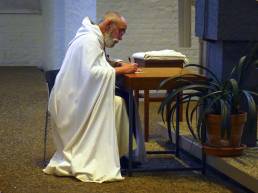
Becoming a monk
The first thing is to contact the Vocation Director and plan a visit to the monastery. After a series of visits, you may begin the formal application process, which includes interviews, a background check and psychological testing. If accepted, you may apply to enter as a Postulant.
Based on your application and interviews, you, the abbot and his council will discern if God is calling you to continue on this path. If so, you may enter as a Postulant. The Postulant moves into the monastery and begins living the monastic life and is identifiable by a hooded smock. This is a chance to find out if you and Gethsemani are a good fit. There are no obligations involved during this six-month period.
After the postulancy comes the two-year Novitiate. As a Novice, you will be clothed in the monastic habit, be addressed as “brother,” and in many cases take on a monastic name.
During this two-year period, novices are instructed in monastic observances, especially the Divine Office, lectio divina, prayer and manual work.
The period is one of deeper integration into the community, but no formal commitments are made at this time.
If at the end of the two-year novitiate you are clearly seeking God and are well suited to life at Gethsemani, you may profess simple vows and become a junior monk.
Juniors make one-year vows of stability, obedience and conversatio morum (fidelity to the monastic life). These vows are then renewed each year.
Juniors are clothed in the black scapular and leather belt of the professed and are given formal job responsibilities. They also continue their studies under the guidance of a Junior Master.
After three years as a junior monk, if you, the abbot and the monastic community discern this is truly your vocation, you may freely apply to take solemn vows for life.
Am I eligible?
What then, dear brothers, is more delightful than this voice of the Lord calling to us? See how the Lord in his love shows us the way of life. – Rule of St. Benedict
The Abbey of Gethsemani welcomes inquiries from Roman Catholic men considering a call to monastic life.
A prospective candidate needs to be between 22 and 50 years of age and to have good mental and physical health. The most important requisite is a sincere search for God.
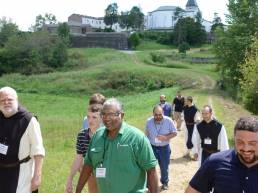
My Lord God, I have no idea where I am going. I do not see the road ahead of me. I cannot know for certain where it will end. nor do I really know myself, and the fact that I think I am following your will does not mean that I am actually doing so. But I believe that the desire to please you does in fact please you. And I hope I have that desire in all that I am doing. I hope that I will never do anything apart from that desire. And I know that if I do this you will lead me by the right road, though I may know nothing about it. Therefore will I trust you always though I may seem to be lost and in the shadow of death. I will not fear, for you are ever with me, and you will never leave me to face my perils alone.Thomas Merton
Get Started
Get in touch with our Vocation Director by sending an email to vocations@monks.org or simply fill out the form below.
